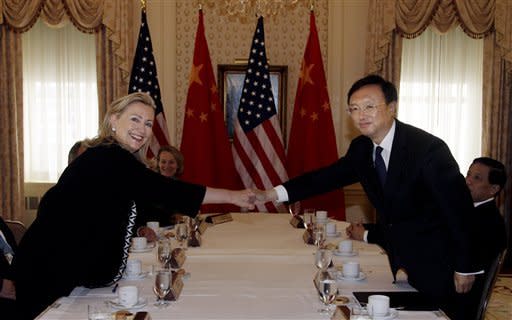 The Envoy
The EnvoyHillary Clinton to lay out her “doctrine on economic statecraft” in New York speech Friday

Secretary of State Hillary Clinton will give a major address on her vision for economic statecraft in New York Friday. In the address--which The Envoy exclusively previewed last week--Clinton will lay out what her aides say she sees as a major strategic legacy of her tenure as Secretary of State: a doctrine calling on the U.S. diplomatic corps to make advancing United States economic interests a central mission of the U.S. diplomatic agenda.
"It's a wide-ranging speech and covers all the ground," one Clinton aide told The Envoy Thursday. At bottom, Clinton will lay out the case that "foreign policy and economic interests and economic policy are indivisible," the official said. The message is especially timely, the source added, when "you've got economic realities driving so much of the foreign policy headlines"--from the Eurozone debt crisis, to the Free Trade Agreements with South Korea, Colombia and Panama passed by Congress Wednesday, to the Arab spring uprisings, to the Occupy Wall Street protests.
Clinton tested out some of the key themes of the address at a small gathering of outside policy experts and economic thinkers invited to the State Department Wednesday, State Department officials told The Envoy.
Clinton will deliver the address Friday morning at the Sheraton on 53rd Street in New York, at a gathering hosted by the Economic Club of New York. Invited to attend are several key economic policy and statecraft thinkers--"a critical mass of believers"--as the aide put it. Among them: economists Nouriel Roubini and Stephen Roach, currency guru Stephen Jen, and former senior Pentagon official and Council on Foreign Relations president emeritus Leslie Gelb. (Gelb has long been making a related case in foreign-policy circles--see, for instance, his 2010 Foreign Affairs piece, "GDP Now Matters More Than Force: a U.S. foreign policy for the age of economic power.")
As the Envoy reported last week, the Clinton '"doctrine" on economic statecraft draws on a growing consensus on the convergence of diplomatic and economic interests. Officials at the State Department, White House, Pentagon and intelligence community are increasingly mindful of the centrality of the global economy to the core challenge of managing global diplomacy. The struggle to manage U.S. economic interests, these thinkers agree, cannot be neatly separated out from America's national security strength and ability to project foreign policy power and the nation's influence in the world over the coming decade. This is especially the case, they concur, in the power shifts already underway including the rising economic power of such countries as Brazil, Turkey, India and China.
"As we pursue recovery and growth, we are making economics a priority of our foreign policy," is how Clinton put it at a speech to the International Institute for Strategic Studies-Shangri La conference in Hong Kong in July. "Because increasingly, economic progress depends on strong diplomatic ties and diplomatic progress depends on strong economic ties. And so the United States is working to harness all aspects of our relationships with other countries to support our mutual growth."
"The trading floor is increasingly replacing the battlefield as the forum for state contacts," one State Department adviser further explained it last week to The Envoy, speaking on condition of anonymity so as to describe the department's internal thinking on the economics speech more freely. "This is coming from a sense that we are seeing the lines between national security and economic security blur as emerging powers are doing more to advance their economic power, and fitting their national security strategy more around economic interest."
A key precept in Clinton's effort is addressing a kind of cultural lag in the sprawling Washington bureaucracy. Lead policy makers may recognize the pivotal role that economics plays in global diplomacy--but in many ways, the diplomatic bureaucracy needs to catch up. Clinton's planned speech will be in large part a call to her own agency's ambassadors, diplomatic staff and analysts to shift their thinking.
And as Clinton lays out that vision in more detail, she will stress two main bulwarks. First, she will highlight the need to advance relations with the wider world as part of the effort to revive the American domestic economic order. And second, she will stress that State Department diplomats and foreign policy thinkers need to work harder to understand how market forces are driving first-order national security challenges in hot spots such as Afghanistan, Iraq and Iran.
Clinton explained the logic behind the new economic initiatives in speeches over the summer that started to lay out her thinking. "All of us here today recognize that a strong economy at home is vital to America's leadership in the world," Clinton told the U.S. Global Leadership Coalition conference in July, before sounding a retrospective note about her tenure at State. "After spending two and a half years as your Secretary of State, traveling nearly 600,000 miles, I have reached one overarching conclusion: Simply put, we need to up our game."
Other popular Yahoo! News stories:
The Clinton doctrine on economic statecraft
Alleged Iran-backed assassination plot puzzles some experts
Herman Cain leaps to front of GOP pack
Want more of our best national security stories? Visit The Envoy or connect with us on Facebook and follow us on Twitter.
